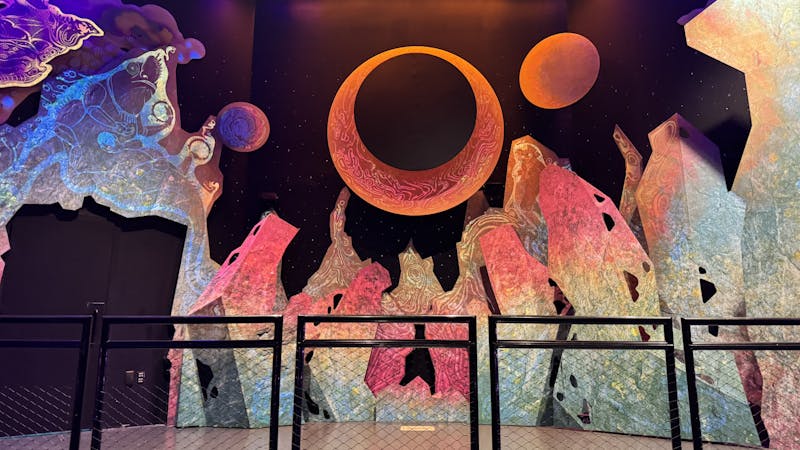Huberman and Hugetz observe American empire

For around 30 years, filmmakers Brian Huberman and Ed Hugetz have been working on their seven-part series “Once I Moved Like the Wind: Geronimo’s Final Surrender to the American Empire.” The two present the fourth part of their film, titled “Carcosa” at Rice Cinema April 13 at 7 p.m.
Hugetz, a former Rice Media Center professor, provided a brief summary of the first three installments in the series charting the Apache leader Geronimo and his resistance against the United States’ government during the late nineteenth century.
“There’s a breakout; Geronimo breaks out of San Carlos reservation, then the U.S. military hunts him for 18 months and then there is a surrender,” Hugetz said.
With this project, Huberman, an associate professor of film at Rice, and Hugetz are interested in the idea of the United States as an empire in the context of aggressive American occupation of Native American land. The filmmakers believe that many Americans don’t see the country’s history with indigenous peoples as what it is: empire-building.
“We’re writing about the history of the American empire, an empire that America has spent most of its time hiding … that’s the big theme of this one, that there’s a monster in America that America is delusional about,” Hugetz said.
In contrast to the first three installments of the series, “The Breakout,” “The Hunt” and “The Surrender” this fourth installment is titled “Carcosa.” The title is based on the Ambrose Bierce short story “An Inhabitant of Carcosa,” about a man who contemplates death after waking up from a sickness-induced sleep in an unfamiliar land, Hugetz said.
As shown by the difference in titles, the fourth part is a departure from the first three. According to Huberman, it’s much more personal and introspective.
“It’s much more of an interior journey,” Huberman said.
Because Huberman was battling liver cancer during the majority of production, the atmosphere, tone and themes of the film echo that sentiment, he said.
“A lot of this film is autobiographical stuff of me, and I’m not well — in fact, I’m dying,” Huberman said. “On occasion I find myself in areas where the boundaries between hallucination and reality don’t seem to matter too much.”
The film includes around three decades of material. None of it was created for a specific script, but it was brought together after Huberman and Hugetz saw thematic threads.
“All those years, I had that stuff and never thought about it, and then this empire theme began to expose itself with this project,” Huberman said.
Huberman said his process is to shoot material and then let projects unfold on their own. With “Once I Moved Like the Wind,” Huberman and Hugetz’s idea of what the project would become changed significantly over the course of production.
“Well initially, I thought we were gonna make a film. Then that turned into 2-3 episodes, and I thought ‘that seems reasonable.’ But 7? That was clearly never the plan,” Huberman said.
Huberman and Hugetz approached the film this way because they wanted to focus on observation and let the film travel its own course.
“It’s allowing the film to reveal itself and tell its story and that’s what we’ve done, I think,” Huberman said.
Both Huberman and Hugetz say they are deeply influenced by what they call observational cinema, a filmmaking movement at its peak in the 1960s and ’70s that focused on showing events as they were and trying to remove as much of the filmmaker’s bias as possible.
“There was a belief at the time, and we still believe it, that there’s something that the camera can do that nothing else can do,” Hugetz said.
Huberman and Hugetz have been working together for almost 50 years. Hugetz believes that the strength of their partnership comes down to one thing: their interest in observation.
“If you had to say, ‘What’s our connection that’s gone on for over 50 years?’ — it’s that,” Hugetz said. “We differ in so many ways, but we agree on that it all really comes back to being present, paying attention to what is happening.”
More from The Rice Thresher

Thresher’s guide to arts and entertainment in Houston
New to the city? Unsure how to spend your time procrastinating on homework? You’re in luck — Houston is a playground if you know where to look, and most of it is an easy metro ride or short commute from campus. Here’s a starter pack of spots that deliver fresh air, brain food and the occasional “wait, this is in Houston?” moment.

Thresher’s Lollapalooza report: Who ruled Grant Park?
Chicago’s Grant Park ran on pure dopamine this weekend — surprise debuts, late-but-worth-it arrivals, confetti, fireworks and at least three mass sing-alongs an hour. From Joey Valence & BRAE road-testing new indietronica to A$AP Rocky cracking open his vault, T-Pain turning the field into karaoke and Olivia Rodrigo summoning Weezer, Lollapalooza felt like a live-wire mixtape. Doechii built a universe, TWICE made history and Sabrina signed off with a superstar-cementing finale. Here’s what actually lived up to the skyline.
“Ginny & Georgia” Season 3: A Messy, Magnetic Villain Origin Story
I’ll admit it: I came into “Ginny & Georgia” expecting another glossy Netflix soap that looks great in a weekend binge but evaporates from memory by Monday. By the end of season three, I realized I’d been doing something I rarely do with shows like this: I was taking notes. Not on the plot (though it’s as twisty and outrageous as ever), but on the characters. I loved them. I was grinning from ear to ear watching them scheme, stumble and monologue their way through impossible situations. That’s when I knew: this show had done something right.


Please note All comments are eligible for publication by The Rice Thresher.